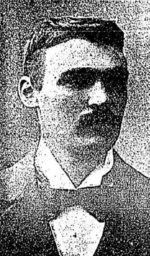Joe Wilson (Australian footballer), Date of Birth, Date of Death
TweetJoe Wilson (Australian footballer)
Australian cricketer (1870-1912)About Joe Wilson (Australian footballer)
- Joseph Francis Wilson (27 September 1870 – 7 December 1912) was an Australian sportsman who was prominent during the late 19th century.
- Originally from Launceston, Tasmania, he was educated at Launceston Grammar School and played Australian rules football and cricket for the school's firsts aged only 15.
- In addition to his school sports, Wilson played football for the Launceston Football Club in the Northern Tasmanian Football Association (NTFA) and cricket for several senior Launceston clubs.
- He established himself as one of Launceston's best all-round sportsmen by the time he completed high school; he was a prominent member of Launceston Football Club's consecutive NTFA premiership teams of 1888 and 1889, and he regularly represented Northern Tasmania in cricket and football. Wilson moved to Melbourne in 1890 after being offered a banking job on the condition he play for the Melbourne Football Club, which competed in the Victorian Football Association (VFA), and the Melbourne Cricket Club (MCC).
- He played for the cricket club for four seasons, but was never consistently selected in the first XI.
- Wilson's most notable performances for the MCC were the final match of the 1892–93 season when he was part of a last-wicket partnership that secured the premiership for Melbourne and a match against a touring English XI where he took the wickets of three Test cricketers. As a footballer, Wilson was known for his marking and versatility—he was as a utility who could be positioned as a forward, defender or follower.
- He quickly established himself as one of Melbourne's best players and represented Victoria in his second season with the club.
- Melbourne had been one of the weaker sides in the competition when he joined, but the recruitment of Wilson and several other prominent players began to steadily turn the club around.
- By the mid-1890s, Melbourne was a regular contender for the VFA premiership and in 1893 and 1894 finished runners-up to powerhouse Essendon.
- Towards the end of the 1895 season, the Melbourne captain, Eddie Fox, retired and Wilson was appointed his replacement for the remainder of the year.
- He continued in the role for a further season before retiring at the end of 1896.
Read more at Wikipedia
See Also
- Famous People's Birthdays on 27 September, Australia
- Famous People's Birthdays in September, Australia
- Famous banker's Birthdays on 27 September, Australia
- Famous banker's Birthdays in September, Australia
- Famous cricketer's Birthdays on 27 September, Australia
- Famous cricketer's Birthdays in September, Australia


 Date of Birth:
Date of Birth: 